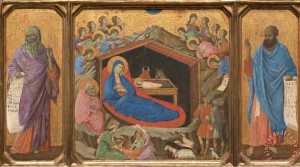Thoughts on Today’s Lessons for Dec. 18, 2016

The Nativity with the Prophets Isaiah and Ezekiel (1308-1311) tempera on single poplar panel by Duccio di Buoninsegna. Andrew W. Mellon Collection, National Gallery of Art, Washington, D.C.
In living through the four weeks of Advent, we deepen our appreciation for the coming of the Messiah, the Incarnation of God becoming fully human and fully divine in Jesus. Today’s readings conclude Advent with eager anticipation for the coming of God’s kingdom through the line of King David. The Prophet Isaiah tells of God warning David’s descendant, King Ahaz, that his land will soon be conquered, but that a child named Immanuel – “God With Us” – will be born to a young woman and will eventually bring good in place of evil.
Today’s Psalm, too, remembers the shame and disappointment of being conquered. It calls on God in a voice of lament, asking to be spared the divine anger that has left the people with “bowls of tears to drink” as their enemies laugh them to scorn. Send a man of God’s right hand, the strong son of man, they beg, promising never again to turn from God’s way if only God will save them.
Second Reading: Romans 1:1-7
Paul gets directly to the point as he begins his letter to this congregation that he has not yet met: He is an apostle of Jesus, called to that ministry; Jesus is the son of God, the descendant of David whom the prophets had foretold; and through his death and resurrection, Jesus Christ is Lord, the Son of God. Then he assures his mostly Gentile audience that he comes to them in Jesus’ name. They, too, are God’s beloved. Then, only after these important assurances, does he come back to a proper formal greeting: “Grace to you and peace from God our Father and the Lord Jesus Christ.”
Gospel: Matthew 1:18-25
Christmas is drawing near! Today we hear Matthew’s version of the events leading up to Jesus’ birth. While Luke’s Nativity, the other familiar Christmas Gospel, tells the story from the viewpoint of Mary and her relatives, Matthew gives us Joseph’s point of view. How do you suppose a man of this patriarchal Near Eastern culture might react, learning that his young fiancee is pregnant but not with his child? Joseph prefers to end the engagement quietly, without scandal or gossip. But then an angel comes to assure Joseph that Mary is bearing God’s son, in words almost mirroring the Isaiah prophecy: “Look, the virgin shall conceive and bear a son, and they shall name him Emmanuel.” (The Hebrew word translated as “young woman” in Isaiah now reappears in the New Testament as “virgin” in Greek.)
